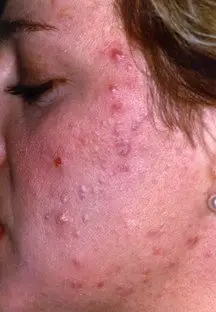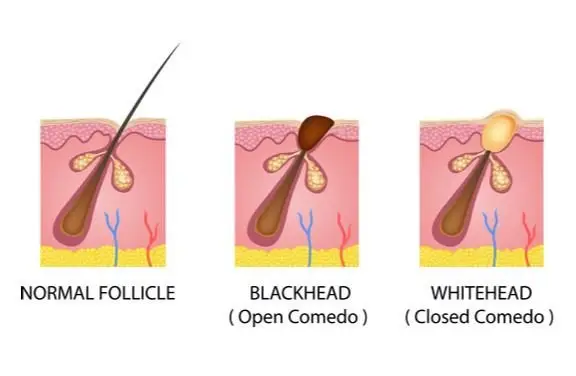What is acne?

Acne is a common skin condition. It is caused by inflammation of the hair follicles and oil-producing (sebaceous) glands of the skin.
Hair follicles are the tiny structures that grow hair in the scalp. Sebaceous glands produce sebum. On areas where acne develops, sebaceous glands surround the hair follicles. The combination of the sebaceous glands and the hair follicles is the "pilosebaceous unit," where acne pimples and cysts develop. Sebum moisturizes hair and skin. Each hair pushes up through the skin surface along with sebum.
Acne often begins during puberty. It occurs when sebaceous glands in the skin are over-stimulated to produce sebum and skin cells are not shed normally. These sticky cells block the skin's hair follicles, trapping the sebum.
The blocked, oil-filled follicle then causes the bacteria normally in the hair follicles to multiply. This leads to inflammation, redness and pimples (pustules).
|
|
In adolescents, acne flare-ups probably are related to a natural increase in androgen hormones during the teen years. These androgens stimulate the sebaceous glands to produce excess sebum. Hereditary factors also contribute to the problem.
Other factors that can lead to acne include:
- Oily cosmetics
- Humidity
- Heavy sweating
- Problems with the ovaries or adrenal glands
- Drugs such as:
- Lithium
- Steroids, both prescription steroids and potentially harmful "body-building" steroids
Acne is not related to diet or poor hygiene. In fact, too much washing can cause an acne flare-up to get worse.
Symptoms of acne
Acne can cause:
-
Blackheads and whiteheads (comedones). Comedones are enlarged hair follicles filled with sebum. Blackheads are comedones that have pushed through the skin's surface. Exposure to air causes the sebum to turn black. Whiteheads are comedones that have not pushed through the skin's surface.
|
|
-
Pimples (pustules). These are inflamed hair follicles. The bacteria in the follicle multiply, attracting infection-fighting cells. These release substances that cause irritation and redness. The follicle then ruptures and spills the contents into the surrounding skin. This causes more inflammation.
|
|
-
Nodules and cysts. These are larger infections of the hair follicles. They extend deeper into the skin, forming firm, deep bumps and swellings. Like pimples, they are caused by increased sebum production and bacterial growth, which cause irritation and redness.
In girls and women, acne often flares up at certain points in the menstrual cycle.
Diagnosing acne
Your doctor usually can diagnose acne based on a simple physical examination. He or she will look for acne comedones, pustules, nodules and cysts on your face, chest, back, upper arms and shoulders.
Your doctor will ask questions about your medical history to try to identify contributing factors. You will be asked about your:
- Menstrual history
- Patterns of hair growth
- Cosmetics
- Facial cleansers
- Medications
Treatment options
The following list of medications are in some way related to or used in the treatment of this condition.
- Accutane
- doxycycline
- Aldactone
- spironolactone
- Retin-A
View more treatment options
Expected duration of acne
Acne flare-ups may occur at any time after puberty. They are more common during the teen years.
Preventing acne
Acne cannot be prevented.
Acne develops in most people. It is a normal part of maturing. However, some people are more prone to developing acne.
Treating acne
Acne can be treated with:
- Salicylic acid washes. These washes help to empty comedones of sebum.
- Benzoyl peroxide gels. These medications are applied to the skin as a thin film. They:
- Dry and peel the skin
- Fight the growth of bacteria
- Help to clear blocked hair follicles
Some are available in weaker over-the-counter lotions. If these don't work, stronger and more effective gel forms are available by prescription.
- Azelaic acid cream. Apply to clean, dry skin twice per day to start. Then can decrease to once per day. Improvement usually takes a few weeks. It helps fight bacteria and may decrease comedo formation.
- Tretinoin (Retin-A). This is applied to the skin as a cream, gel or liquid. It helps to clear the skin of plugged follicles by increasing the turnover of skin cells. It also increases the skin's sensitivity to sunlight. So tretinoin should be used with a sunscreen.
- Antibiotics. Certain antibiotics can be applied directly to the skin to reduce the growth of acne-causing bacteria.
If these topical treatments fail, acne is treated next with oral antibiotics. However, these medications can have side effects. They are available only by prescription.
Some oral antibiotics can cause birth defects. Women on these antibiotics who are sexually active must use contraception. They need to make absolutely sure they do not become pregnant either during treatment or for one month after treatment.
In severe cases, oral isotretinoin may be considered. This medication can be very effective but can also cause serious side effects including severe birth defects. Strict protocols must be followed. Monthly appointments with the treating doctor must be kept throughout the treatment period to monitor for any side effects. In females of child-bearing age, protocol includes two forms of birth control. The treatment period is usually five months.
When To Call a Professional
Call your doctor if you or your child has acne that is not controlled with over-the-counter washes or gels. Even small amounts of acne can be embarrassing and psychologically painful to young people. Acne can result in scarring.
Prognosis
Acne can almost always be controlled with medication. However, results may not be seen for weeks or months. Most topical medicines work within four to eight weeks. Tretinoin may show peak results in three to six months.
Additional Info
National Institute of Arthritis and Musculoskeletal and Skin Diseases
http://www.niams.nih.gov/







